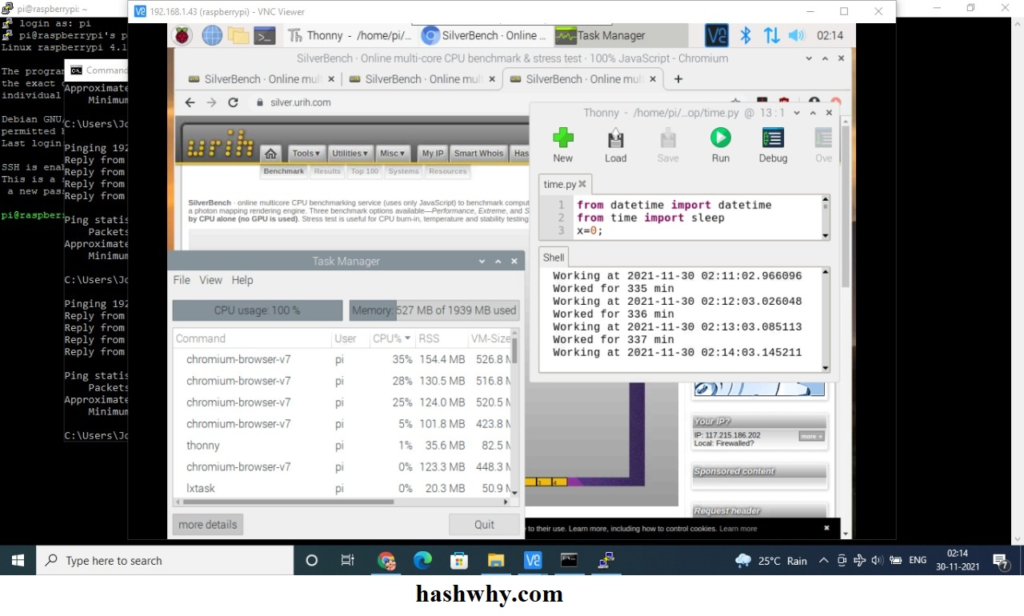5V UPS for RaspberryPi, Embedded Boards and devices
Consumer embedded boards are widely used by hobbyist as well as for Internet of Things (IoT) related products and projects. Most start-ups rely on the embedded boards to demonstrate proof of working, as well as to run their end products on these boards. Some popular names being RaspberryPi, Nvidia Jetson Nano, Beagle Bone, Arduino boards, OrangePi, BananaPi boards etc.
Some applications require that the embedded boards or products run without power interruptions. hashwhy MicroUPS is designed with this in mind. The hashwhy UPS is designed to provide 5V output of uninterrupted supply. The device can give upto 3A of continuous current, which is ample for most embedded boards.
RaspberryPi 4B comes with USB-C power port and up to 2.5A current requirement at maximum. hashwhy MicroUPS comes with 5000mAh, 7500mAh and 10,0000mAh battery options for sufficient backup.
The most common query being asked, is how much of a back up duration can be expected from the hashwhy 5V UPS, when used with the embedded boards. To answer the same, we tested the hashwhy UPS with RasbperryPi 4B (2GB) version. The 10,000mAh version of hashwhy UPS was used for the test.
To check for the backup hours, a python script was run in the RaspberryPi board, which wrote the minutes passed into a file in the storage card. To simulate the complete processor usage, a processor test was run on browser (Chromium).
The RasbperryPi was run on RaspberryPi OS (Buster) desktop edition, with SSH and VNC enabled. Ethernet was plugged in all throughout the test. The python script, the processor test online was run till the hashwhy UPS shut down the Pi, depleting its complete power capacity.
The Python Script used to check the time is as follows:
from datetime import datetime
from time import sleep
x=0;
while 1:
with open('scr.txt', 'a') as file:
file.write('Working at: %s\n' %datetime.now())
print('Working at %s' %datetime.now())
sleep(60)
x=x+1
with open('timerun.txt', 'a') as file:
file.write('Worked for %s min' %x)
print('Worked for %s min' %x)
The processor usage and the RaspberryPi desktop was viewed using VNC when the test was done. A sample screen is given below.

Starting Time: 2021-11-29 20:36:43.100338
Ending Time: 2021-11-30 04:23:10.734506
The RaspberryPi 4B was run for 7 hours, 46 minutes and 27 seconds on the hashwhy 5V UPS 10,000mAh version on the test, without any interruptions.
hashwhy 5V UPS has 3 versions for the 3A current output model, 5000mAh, 7500mAh and 10000mAh. The test was done on the 10,000mAh version. Mathematically converting the data for the rough expected backup time, the following are the expected backup duration for the other models under the same test conditions.
The backup duration would vary depending on the power consumption of the processor, the peripherals connected and the features used. This test is to be treated as a reference for the expected backup duration.
To calculate the expected power backup, we could also divide the expected nominal capacity by the average power consumption of the board or device. The energy contained in the 5V UPS is given below
The average power consumption of the RaspberryPi under test was roughly 4.76W (after factoring in the power loss). We could mathematically derive the backup hours expected by dividing the energy in Wh by the power consumption in Watts (W). It is to be noted that there could be a rough 90-95% efficiency of the device and there could be power losses in the cable as well. A thick and shorter cable would increase the efficiency and thereby increase the backup hours and also the voltage available at the input of the device / board.
We went ahead, and tested the back up duration for RaspberryPi 4B, with the 10000mAh hashwhy MicroUPS, with the processor running at 30-60% of its maximum throughput. The ethernet was plugged in all the time, and VNC server was turned on. The RaspberryPi didn’t have any other headers or devices attached to it. The RaspberryPi ran for 10 hours and 19 minutes without interruption.
Starting Time: 2021-11-30 10:35:36.063460
Ending Time: 2021-11-30 20:55:05.092117
Interpreting the above results mathematically for the other variants available, the following are the expected power backups when using hashwhy 5V 3A MicroUPS.